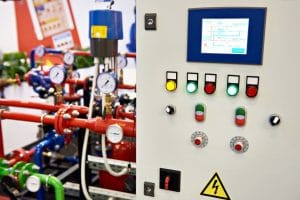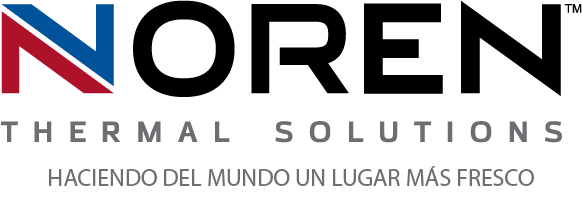 Historically, the process of cooling a company’s electrical control panels used to be quite cumbersome. Out of necessity, electrical enclosures such as control panels had to be adjoined with industrial-strength air conditioning or air compressing equipment to keep a steady flow of chilled air circulating through them. Using such solutions wasn’t necessarily difficult, but keeping them running continuously to keep up with high-performance, everyday production proved a costly and time-consuming hassle. Today, however, most modern companies rely on heat exchangers to cool their control panels and other electrical enclosures more efficiently, and with a higher level of reliability.
Historically, the process of cooling a company’s electrical control panels used to be quite cumbersome. Out of necessity, electrical enclosures such as control panels had to be adjoined with industrial-strength air conditioning or air compressing equipment to keep a steady flow of chilled air circulating through them. Using such solutions wasn’t necessarily difficult, but keeping them running continuously to keep up with high-performance, everyday production proved a costly and time-consuming hassle. Today, however, most modern companies rely on heat exchangers to cool their control panels and other electrical enclosures more efficiently, and with a higher level of reliability.
The need for efficient control panel cooling
Every form of technology involves the need for efficient cooling, and in industrial settings, that need is much more prominent. Electrical control panels and other enclosures contain sensitive components that generate heat as they operate, and that heat can accumulate within the enclosures to form dangerous heat pockets. When the temperature inside of the enclosure rises above the system’s maximum operating temperature, the components can become damaged, start to malfunction, or break down entirely. Therefore, implementing proper control panel cooling solutions is vital to any company’s success, and the efficiency of the cooling solution they choose can greatly impact the success of their overall operations.
Heat exchangers and advanced control panel cooling
Instead of relying on clunky and cumbersome air conditioners or air compressors, modern companies have increasingly turned to advanced heat exchanger technology for their electrical cooling needs. This largely involves using heat exchangers to ensure that their electrical control panels and other enclosures don’t overheat, and that they don’t have to invest in massive amounts of energy or deal with constant downtime. Heat exchangers make control panel much more efficient and streamlined by approaching electrical cooling differently. Instead of utilizing chilled air, the innovative thermal solutions use eco-friendly cooling fluid to absorb waste heat and transfer it in a continuous, easily controlled loop.
Benefits of cooling control panels with heat exchangers
When companies turn to heat exchangers for their electrical cooling needs, the benefits they experience are significant. For example, heat exchangers don’t require as much energy to power, and yet they can achieve more efficient cooling for higher-performance applications on a consistent basis. Also, the process of absorbing and transferring electrical waste heat don’t require the complex machinery that traditional cooling solutions require. Therefore, there is much less need for routine maintenance and far fewer risks of downtime due to malfunctioning thermal management solutions. To learn more about how heat exchangers keep companies’ electrical control panels cooled, call Noren Thermal Solutions in Taylor, TX, at 866-936-6736.







